Career
Nursing
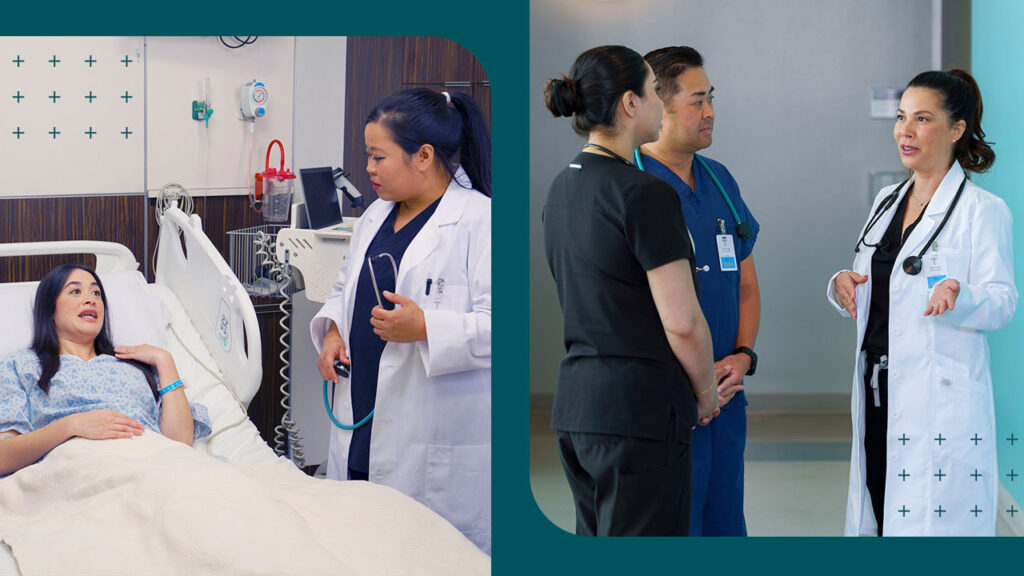
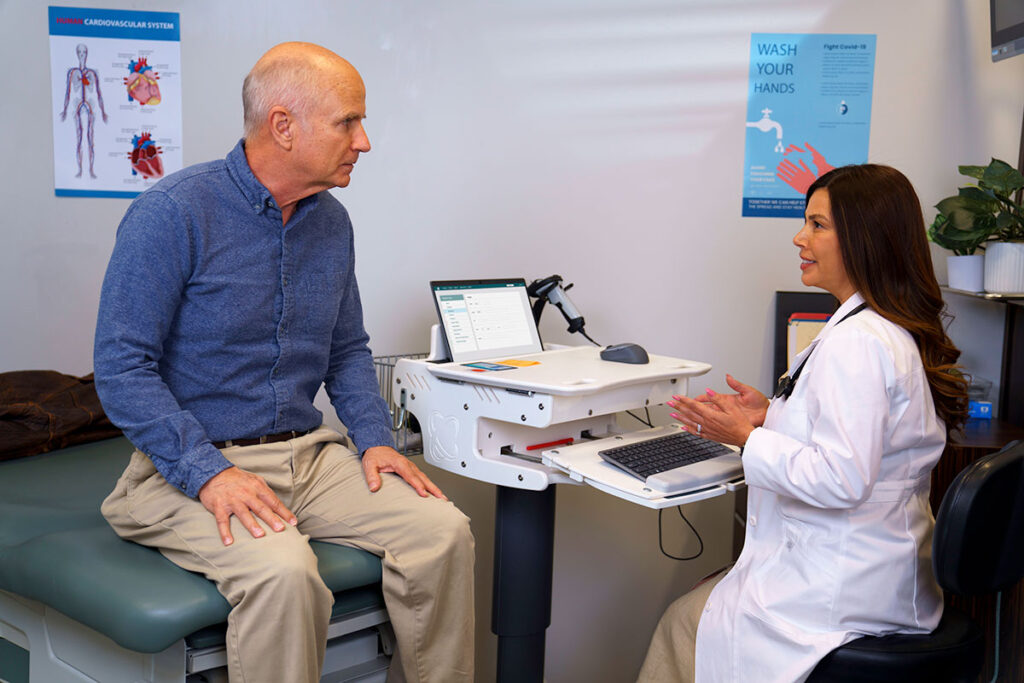

8-week terms allow for start dates throughout the year
Participate in in-person immersive experiences that help prepare you for clinical rotations and for practice
This APRN track is accredited by the Commission on Collegiate Nursing Education1
Develop specialized skills to work in primary care within diverse communities
Learn about industry-current topics such as telehealth, special populations, and emerging trends
Get 24/7 access to your online coursework with mobile-accessible learning
In-person experiences to help you gain hands-on practice in primary care
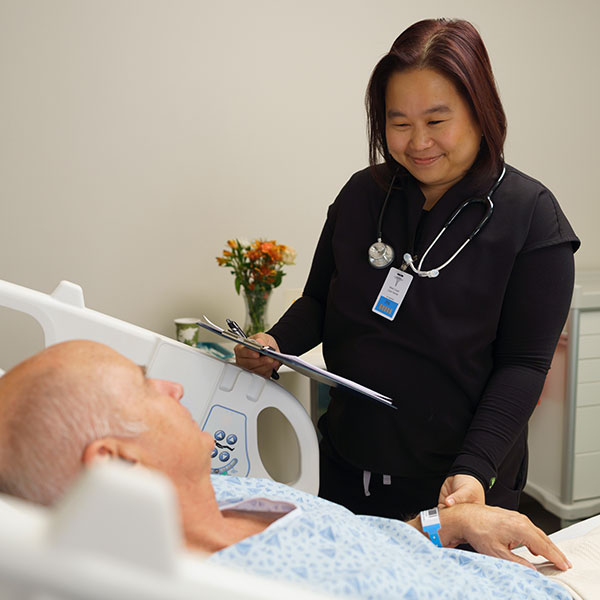
Adult-Gerontology Primary Care Nurse Practitioners (AGPCNPs) are essential members of the healthcare team, providing comprehensive primary care to patients ranging from adolescents (starting at the age of 13) through older adulthood to end of life in clinics, community health centers, and long-term care facilities.
The online MSN – AGPCNP specialization at WCU combines evidence-based coursework with hands-on clinical experience to help equip you with the skills and knowledge needed to thrive in primary care.
Complete required clinical hours in outpatient clinics, long-term care, or specialty settings that reflect the full scope of primary care delivery.
Our curriculum is designed to help prepare you for certification exams through ANCC or AANP and to pursue licensure as an Advanced Practice Registered Nurse (APRN).
Distance Education/Online
49 Credits
20 Months
5 Trimesters
Distance Education/Online
49 Credits
32 Months
8 Trimesters
A student in the MSN Adult-Gerontology Primary Care Nurse Practitioner program at West Coast University participates in two (2) On-site Intensive (OSI) weekends. The OSI brings students to campus to learn, practice and demonstrate essential hands-on skills and competencies needed by nurse practitioners.
| Course Number | Course Name | Total Credit Hours |
|---|---|---|
| Number | Name | Hours |
| MSNC 500 | Nursing Roles in Policy, Ethics, & Finance | 3 |
| MSNC 505 | Scholarship for Advanced Nursing Practice | 3 |
| MSNC 510 | Advanced Nursing Technologies & Collaborative Care | 3 |
| MSNC 515 | Principles of Teaching and Learning | 3 |
| Total Credit Hours: | 12 | |
| Course Number | Course Name | Total Credit Hours |
|---|---|---|
| Number | Name | Hours |
| MSNR 550 | Advanced Pathophysiology | 3 |
| MSNR 555 | Advanced Pharmacology | 3 |
| MSNG 560 | Advanced Health & Physical Assessment | 3 |
| MSNG 600 | Adult Gerontology Primary Care: Introduction to Advanced Practice | 2 |
| MSNG 605 | Adult Gerontology Primary Care: Clinical Reasoning & Differential Diagnosis | 3 |
| MSNG 610 | Adult Gerontology Primary Care: Health I | 2 |
| MSNG 610C | Adult Gerontology Primary Care: Practicum I | 2 |
| MSNG 620 | Adult Gerontology Primary Care: Health II | 2 |
| MSNG 620C | Adult Gerontology Primary Care: Practicum II | 2 |
| MSNG 630 | Women’s and Reproductive Health | 3 |
| MSNG 630C | Adult Gerontology Primary Care: Complex Care Practicum III | 2 |
| MSNG 650 | Adult Gerontology Primary Care: Intensive I | 1 |
| MSNG 650C | Adult Gerontology Primary Care: Residency I | 2 |
| MSNG 660 | Adult Gerontology Primary Care: Intensive II | 2 |
| MSNG 660C | Adult Gerontology Primary Care: Residency II | 2 |
| MSNG 670C | Adult Gerontology Primary Care: Residency III | 2 |
| MSNG 680 | Adult Gerontology Primary Care: Transition to Advanced Practice | 1 |
| Total Credit Hours: | 37 | |
Total Credit Hours: 49
| Program Credit Distribution | ||
|---|---|---|
| Program Credit Dist. | ||
| Core Nursing Semester Credits: | 12 | |
| Adult Gerontology Nurse Practitioner Track Semester Credits: | 37 | |
| Total Program Semester Credits: | 49 | |
How Much Does the MSN – Adult-Gerontology Acute Care Nurse Practitioner Track Cost?
We know school is a substantial commitment. At WCU, we want to equip you with all the information you need to make the right decision for your future.
Our goal is to give you a clear understanding of MSN – AGPCNP online tuition costs so you can be well-informed as you navigate the application and enrollment process. To assist you in your decision, we provide a breakdown below of the MSN – AGPCNP track costs at West Coast University.
We offer several financial aid options — including scholarships, grants, and loan access — to help support you through your studies. For more information about your financial support options, visit our financial aid page.
Estimated Cost of Attendance is comprised of both direct costs and indirect costs, as outlined in the charts below. The purpose of the Cost of Attendance (COA) is to provide students and families with an estimated cost to attend West Coast University. The COA includes both direct and indirect cost estimates and are categorized as follows: (1) Direct costs are paid directly to West Coast University and are shown separately for each program; (2) Indirect costs are not paid to West Coast University and are estimates students may use to budget expenses they may incur while attending school. While actual indirect costs may vary, West Coast University estimates these amounts based on the number of months in an academic year and whether students will live with parents or off campus.
| Degree Type | Effective prior to Fall I 2026 | Effective Fall I 2026 |
| Total Program Credits | 49 | 49 |
| Program Length (Full-Time) | 5 trimesters | 5 trimesters |
| MSN Core(per credit x 18 credits;12 credits effective Fall I 2024) | $700 | $721 |
| APRN Core(per credit cost x 32 credits; 38 credits effective Fall I 2024) | $810 | $850 |
| Total Tuition Cost | $38,370 | $40,102 |
| STRF1 | $0 | $0 |
| Technology Fee2 | $2,500 | $2,500 |
| Estimate for Program Supply Fees3 | $2,300 | $2,300 |
| Program Fee (Clinical)3 | $3,300 | $3,300 |
| Estimated Total Program Costs (Texas) | $46,470 | $48,367 |
| Estimated Total Program Costs (California) | $46,470 | $48,367 |
Indirect Costs
| 8 Month Academic Year5 | ||||
| Prior to Fall I 2026 | Starting Fall I 2026 | |||
| with parents | off campus | with parents | off campus | |
| Federal Student Loan Fees | $220 | $220 | $220 | $220 |
| Living Expenses (Food & Housing) | $2,616 | $8,728 | $2,616 | $8,728 |
| Transportation | $1,776 | $1,776 | $1,920 | $1,920 |
| Personal Expenses | $5,656 | $5,656 | $6,448 | $6,448 |
| Total | $10,268 | $16,380 | $11,492 | $17,660 |
1 Effective April 1, 2024, the Student Tuition Recovery Fund (STRF) assessment rate will be zero dollars and zero cents ($0.00) per one thousand dollars ($1,000) of institutional charges.
The State of California established the Student Tuition Recovery Fund (STRF) to relieve or mitigate economic loss suffered by a student in an educational program at a qualifying institution, who is or was a California resident while enrolled, or was enrolled in a residency program, if the student enrolled in the institution, prepaid tuition, and suffered an economic loss. Unless relieved of the obligation to do so, you must pay the state-imposed assessment for the STRF, or it must be paid on your behalf, if you are a student in an educational program, who is a California resident, or are enrolled in a residency program, and prepay all or part of your tuition.
You are not eligible for protection from the STRF and you are not required to pay the STRF assessment, if you are not a California resident, or are not enrolled in a residency program.
It is important that you keep copies of your enrollment agreement, financial aid documents, receipts, or any other information that documents the amount paid to the school. Questions regarding the STRF may be directed to the Bureau for Private Postsecondary Education, 1747 N. Market Blvd. Ste 225 Sacramento, CA 95834, (916) 431-6959 or (888) 370-7589.
To be eligible for STRF, you must be a California resident or enrolled in a residency program, prepaid tuition, paid or deemed to have paid the STRF assessment, and suffered an economic loss as a result of any of the following:
To qualify for STRF reimbursement, the application must be received within four (4) years from the date of the action or event that made the student eligible for recovery from STRF.
A student whose loan is revived by a loan holder or debt collector after a period of noncollection may, at any time, file a written application for recovery from STRF for the debt that would have otherwise been eligible for recovery. If it has been more than four (4) years since the action or event that made the student eligible, the student must have filed a written application for recovery within the original four (4) year period, unless the period has been extended by another act of law.
However, no claim can be paid to any student without a social security number or a taxpayer identification number.
2Technology Fee includes student technical support, Office 365, blended and online course delivery/learning management system, mobile app, student portal technology and access, and required electronic course materials/software.
3Supplies and licensure prep fees include a WCU identification card, background check, standardized patients, supplies, equipment for onsite intensives, and APRN predictor exams for APRN students. Supplies become student purchases once issued to students. Students who drop or have been dismissed after supplies have been issued will assume ownership for these items and will not be eligible for refunds. For details on all the supplies please contact the Bursar Office.
4 Program supplies include WCU identification card and background check.
5 The purpose of the Cost of Attendance (COA) is to provide students and families with an estimated cost to attend West Coast University. The COA includes both direct and indirect cost estimates. Direct costs are paid directly to West Coast University and are shown separately for each program. Indirect costs are not paid to West Coast University and are estimates students may use to budget expenses they may incur while attending school. While actual indirect costs may vary, West Coast University estimates these amounts based on the number of months in an academic year and whether students will live with parents or off campus.
| Degree Type | Effective prior to Summer II 2025 | Effective Summer II 2025 |
| Total Program Credits | 49 | 49 |
| Program Length (Full-Time) | 8 trimesters | 8 trimesters |
| MSN Core (per credit x 15 credits) | $700 | $721 |
| APRN Core(per credit cost x 32 credits; 38 credits effective Fall I 2024) | $810 | $850 |
| Total Tuition Cost | $38,370 | $40,102 |
| STRF1 | $0 | $0 |
| Technology Fee2 | $4,000 | $4,000 |
| Estimate for Program Supply Fees3 | $2,300 | $2,300 |
| Program Fee (Clinical)3 | $3,300 | $3,465 |
| Estimated Total Program Costs (Texas) | $47,970 | $49,867 |
| Estimated Total Program Costs (California) | $47,970 | $49,867 |
Indirect Costs
| 8 Month Academic Year5 | ||||
| Prior to Fall I 2026 | Starting Fall I 2026 | |||
| with parents | off campus | with parents | off campus | |
| Federal Student Loan Fees | $220 | $220 | $220 | $220 |
| Living Expenses (Food & Housing) | $2,616 | $8,728 | $2,616 | $8,728 |
| Transportation | $1,776 | $1,776 | $1,920 | $1,920 |
| Personal Expenses | $5,656 | $5,656 | $6,448 | $6,448 |
| Total | $10,268 | $16,380 | $11,492 | $17,660 |
1 Effective April 1, 2024, the Student Tuition Recovery Fund (STRF) assessment rate will be zero dollars and zero cents ($0.00) per one thousand dollars ($1,000) of institutional charges.
The State of California established the Student Tuition Recovery Fund (STRF) to relieve or mitigate economic loss suffered by a student in an educational program at a qualifying institution, who is or was a California resident while enrolled, or was enrolled in a residency program, if the student enrolled in the institution, prepaid tuition, and suffered an economic loss. Unless relieved of the obligation to do so, you must pay the state-imposed assessment for the STRF, or it must be paid on your behalf, if you are a student in an educational program, who is a California resident, or are enrolled in a residency program, and prepay all or part of your tuition.
You are not eligible for protection from the STRF and you are not required to pay the STRF assessment, if you are not a California resident, or are not enrolled in a residency program.
It is important that you keep copies of your enrollment agreement, financial aid documents, receipts, or any other information that documents the amount paid to the school. Questions regarding the STRF may be directed to the Bureau for Private Postsecondary Education, 1747 N. Market Blvd. Ste 225 Sacramento, CA 95834, (916) 431-6959 or (888) 370-7589.
To be eligible for STRF, you must be a California resident or enrolled in a residency program, prepaid tuition, paid or deemed to have paid the STRF assessment, and suffered an economic loss as a result of any of the following:
To qualify for STRF reimbursement, the application must be received within four (4) years from the date of the action or event that made the student eligible for recovery from STRF.
A student whose loan is revived by a loan holder or debt collector after a period of noncollection may, at any time, file a written application for recovery from STRF for the debt that would have otherwise been eligible for recovery. If it has been more than four (4) years since the action or event that made the student eligible, the student must have filed a written application for recovery within the original four (4) year period, unless the period has been extended by another act of law.
However, no claim can be paid to any student without a social security number or a taxpayer identification number.
2Technology Fee includes student technical support, Office 365, blended and online course delivery/learning management system, mobile app, student portal technology and access, and required electronic course materials/software.
3Supplies and licensure prep fees include a WCU identification card, background check, standardized patients, supplies, equipment for onsite intensives, and APRN predictor exams for APRN students. Supplies become student purchases once issued to students. Students who drop or have been dismissed after supplies have been issued will assume ownership for these items and will not be eligible for refunds. For details on all the supplies please contact the Bursar Office.
4 Program supplies include WCU identification card and background check.
5 The purpose of the Cost of Attendance (COA) is to provide students and families with an estimated cost to attend West Coast University. The COA includes both direct and indirect cost estimates. Direct costs are paid directly to West Coast University and are shown separately for each program. Indirect costs are not paid to West Coast University and are estimates students may use to budget expenses they may incur while attending school. While actual indirect costs may vary, West Coast University estimates these amounts based on the number of months in an academic year and whether students will live with parents or off campus.
Applicants for the program must meet the following requirements (MSN All Track Option):
*Applicants submitting non-U.S. or non-English transcripts should refer to the International Admissions section of the catalog
Additional Admissions Requirements Advanced Practice Registered Nurse (APRN) Tracks Only:
In addition to the admissions requirements above, applicants to the Master of Science in Nursing – Advanced Practice Registered Nurse (APRN) tracks must also meet the following admissions requirements:
*Students admitted to APRN tracks under previous admissions requirements and have withdrawn that have completed more than 75% of the credits associated with the program will be re-admitted to the previous version of their program using previous requirements.
For additional admission requirements, please visit our catalog.
New academic terms begin, on average, every eight weeks. The number of trimesters needed depends on the program and pace selected for the AGPCNP track. For the most updated start-to-completion schedule, view the Academic Calendar.

Helping You Find the Right Clinical Facility
Our WCU Clinical Placements team is committed to supporting you from start to finish in your clinical practice journey. We can help you find the right preceptor and clinical site that matches with your goals, guide you through the process of getting your preceptor and clinical site approved, or advise you on how to have a successful practicum experience. Your assigned coordinator of clinical relations will be available for coaching calls.
With partnerships with various healthcare providers, West Coast University has valuable resources for helping students with clinical practice placements.
Support for Students Beyond Graduation
Our Career Services department offers ongoing guidance and professional development workshops to our graduates on an ongoing basis.3 We help our AGPCNP graduates learn how to write better resumes, improve their job searches, prepare for interviews, and more.
Additionally, before graduation, we provide our students with support through various channels, including free tutoring, Student Success advisors, admissions and financial aid advisors, and more.

Dr. George Peraza-Smith is a Fellow of the American Association of Nurse Practitioners (AANP). He obtained his Doctor of Nursing Practice (DNP) from Case Western Reserve University, as well as a Bachelor of Science in Nursing (BSN) and Master of Science in Nursing (MSN) in nursing administration from the University of Texas Medical Branch. He has both a gerontological nurse practitioner post-master’s certificate from the University of South Florida and an adult nurse practitioner post-doctoral certificate from Brandman University.
Dr. Peraza-Smith is board-certified as an adult-gerontology primary care nurse practitioner (AGPCNP), a gerontological nurse practitioner, an APRN gerontological specialist, and a certified nurse educator. He is the immediate past president of the Florida Nurses Association and the immediate past inaugural president of the Gerontology Nursing Certification Commission (GNCC) for which he remains a trustee on the board. The GNCC offers an APRN gerontological specialist certification to distinguish APRNs who possess expert knowledge, experience, and skill in managing the complex health needs of older adults.
Dr. Peraza-Smith has been teaching in MSN and DNP online and hybrid programs for over 10 years. He has held academic leadership positions such as professor, program director, department chair, and associate dean. Dr. Peraza-Smith resides in Zephyrhills, Florida with his husband and two children.
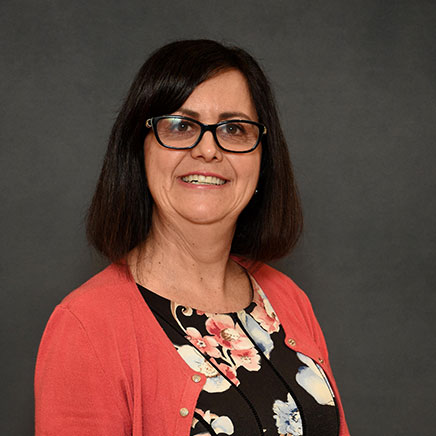
Dr. Christine Bouchard graduated from a dual master’s with an MS in Adult Nurse Practitioner (ANP)/Occupational Health Nursing and an MPH in Environmental and Occupational Health. She then went on to get her PhD in nursing. She’s been working as an ANP for 23 years in primary care, urgent care, and occupational health. Having seen patients with mental health issues in all these settings, Dr. Bouchard went back to school for her PMHNP PGC. She will have completed her program on August 13, 2023, and will shortly thereafter sit for the ANCC PMHNP national board certification exam.
Dr. Bouchard believes in being active in the NP community including securing sponsors for the local Gerontological Advanced Practice Nurses Association and being on the board of the Tampa Bay Advanced Practice Nurses Council, an organization with over 400 members, for over four years where she currently serves as the Managing Director. She’s taught nursing students on ground, online, and hybrid at the ADN, BSN, RN to BSN, MSN, and DNP levels. She’s also served as BSN, RN to BSN, HS, and HCM Program Director at an on-ground campus. She’s currently an Associate Professor in the Post-Master’s AGPCNP certificate program and the Course Lead for the Advanced Pathophysiology, Advanced Pharmacology and Advanced Assessment (3Ps).
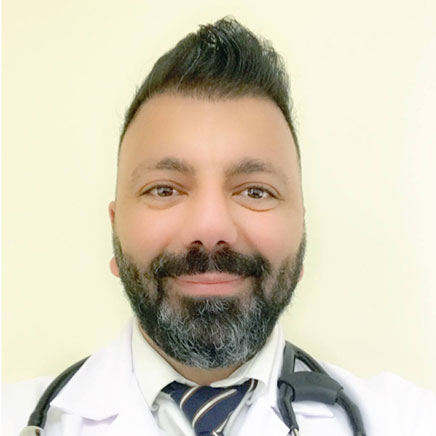
Dr. Alomari currently serves as the Program Assistant Dean for the DNP, Adult-Gerontology Primary Care Nurse Practitioner, MSN – Nurse Leader, MSN – Educator, and RN to BSN programs at West Coast University. Dr. Alomari’s administrative acumen is noteworthy, having held various positions of responsibility throughout his career. Prior to his current role as Program Assistant Dean, he served as one of the Program Deans of Advanced Practice Nursing Programs at West Coast University, where he successfully guided the development and growth of these specialized programs. His exceptional leadership and strategic vision have earned him respect and admiration among his colleagues and peers.
Dr. Alomari has attained a bachelor’s, master’s, and doctoral degree in nursing, underscoring his commitment to continuous professional growth and advancement. With a background as a registered nurse and nurse practitioner, Dr. Alomari possesses a comprehensive understanding of clinical practice that enriches his teaching and administrative roles.
With an impressive 15-year tenure in higher education, Dr. Alomari has consistently demonstrated his passion for shaping the future of nursing education. His impact extends beyond the walls of his institution, as he is sought after nationally and internationally as a consultant on matters related to nursing education, curriculum development, and accreditation. Through his expertise and guidance, Dr. Alomari has contributed significantly to the enhancement of nursing programs and the quality of education provided to students worldwide.
In addition to his exemplary leadership and consultancy roles, Dr. Alomari is a researcher who has conducted multiple studies in the field. His commitment to advancing nursing practice and patient care is evident through his published articles. By disseminating his findings in reputable journals, Dr. Alomari continues to contribute to the knowledge base of the nursing profession, enriching the understanding and application of evidence-based practice.
Our nursing programs, including those with the Adult-Gerontology Primary Care Nurse Practitioner track, provide industry-current, evidence-based education that is relevant in an ever-evolving healthcare environment. In addition to learning a wide range of skills and modalities that are needed for delivering quality primary care to young adult, adult, and senior patients, you will learn about telehealth, special populations, and the latest trends in medicine.
WCU accepts transfer credits on a case-by-case basis. We recommend speaking with your admission advisor about your eligible credits. WCU may accept credit for previous courses taken through other academic institutions as long as the course meets the requirements of the specific academic program for which it is being considered, and a grade of B (3.0) or better was achieved for a graduate course as documented on official transcripts. Each program maintains its own transfer credit requirements.4
Yes, after you complete your program, you will be eligible to sit for your national board certification exam. WCU offers various tools to help you prepare for the examination: board-style question banks, topic-specific lectures, board review courses, and board predictor exams. These mobile-friendly platforms make it easier for you review materials so you can feel confident upon exam time.
Adult-gerontology primary care nurse practitioners can work in a verity of healthcare settings where young adult, adult, and senior patients are treated, including but not limited to:
Typical AGPCNPs duties include performing physical exams, interpreting diagnostic tests, administering pharmacological and nonpharmacological therapies based on what is appropriate for the patient’s age, and more. AGPCNPs may also be responsible for overseeing a patient’s transition between healthcare facilities and delivering education to patients and their caregivers.5
Every faculty member that teaches in our programs is an experienced, nationally board-certified nursing professional who is active in relevant clinical practice. Additionally, WCU professors are accessible to students. Through the Remind app, faculty members are only a call or text away.
An adult-gerontology primary care nurse practitioner (AGPCNP) is an NP who specializes in general healthcare (including preventative care) for young adult (ages 13 and older), adult, and geriatric patients. An adult-gerontology acute care nurse practitioner (AGACNP) is an NP who provides intensive and acute care for young adult, adult, and geriatric patients with critical conditions.
A Master of Science in Nursing (MSN) – Adult-Gerontology Primary Care Nurse Practitioner (AGPCNP) is a specialized graduate degree that gives you the skills to provide primary care for patients ages 13 and older. WCU’s online AGPCNP program combines online coursework with hands-on clinical experience.
Yes, your coursework for the MSN – Adult-Gerontology Primary Care Nurse Practitioner program will be completed online. However, you should be aware that some in-person practice experience is required for completion of your MSN – AGPCNP degree.
WCU offers two different program paces for the online MSN – AGPCNP track. On the Accelerated pace, the track can be completed in as little as 20 months. On the Working Professional pace, you earn your online MSN – AGPCNP degree in as few as 32 months.
Our AGPCNP program requires the completion of two on-site intensives (OSIs).6 These are in-person, immersive experiences that help prepare students for APRN clinical rotations and practice. Your OSIs will be an opportunity to gain hands-on experience, learn unique skills, and get valuable feedback from instructors.
Financial aid, scholarships, and grants are available to students who meet the eligibility requirements. Some of the available scholarships and grants include the Alumni Pathway Grant (covers up to 20% of tuition), the WCU Health Services Grant (covers up to 10% of tuition), and the WCU Performance Scholarship (covers up to 15% of tuition). To learn about eligibility requirements, visit the scholarships and grants page of our online catalog.
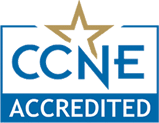
The baccalaureate degree program in nursing, master’s degree program in nursing, Doctor of Nursing Practice program, and post-graduate APRN certificate program at West Coast University are accredited by the Commission on Collegiate Nursing Education 655 K Street, Suite 750, Washington DC 20001, (202) 877-6791 (www.ccneaccreditation.org).
Financial aid and scholarships are available for those who qualify.
1 The baccalaureate degree program in nursing, master’s degree program in nursing, Doctor of Nursing Practice program, and post-graduate APRN certificate program at West Coast University are accredited by the Commission on Collegiate Nursing Education 655 K Street, Suite 750, Washington DC 20001, (202) 877-6791 (www.ccneaccreditation.org).
2 Population Reference Bureau. “Fact Sheet: Aging in the United States” December 2015
3 WCU provides career guidance and assistance but cannot guarantee employment
4 WCU catalog, “Nursing (MSN-AGPCNP), Master of Science Degree – Adult-Gerontology Primary Care Nurse Practitioner Track”
5American Association of Nurse Practitioners, “Are You Considering a Career as an Adult-Gerontology Primary Care Nurse Practitioner?” June 17, 2020
6Students enrolled through the Orange County campus must complete their OSIs in California. Students enrolled through the Texas campus must complete them in Texas. Travel costs are not included in tuition and fees, and students are responsible for arranging transportation.
WCU Distance education programs are delivered out of the California and Texas campuses and may not be available to residents in all states.
Practice Experience is required in order to graduate from the RN to BSN, RN to MSN, MSN, DNP degree and Post-Master’s certificate programs.